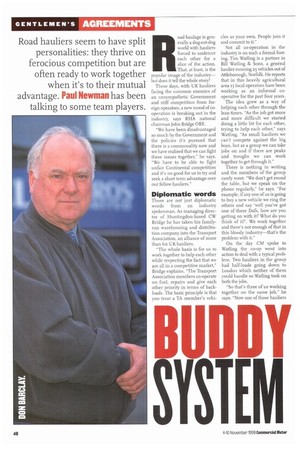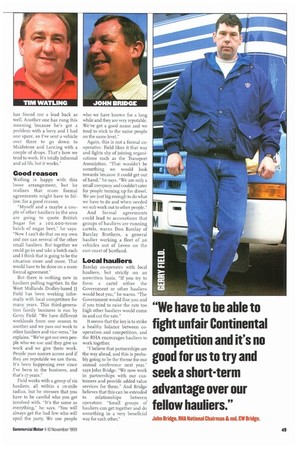AGREEMENTS Road hauliers seem to have split personalities: they thrive
Page 50

Page 51

If you've noticed an error in this article please click here to report it so we can fix it.
on ferocious competition but are often ready to work together when it's to their mutual
advantage. Paul Newman has been talking to some team players. Road haulage is generally a dog-eat-dog world with hauliers forced to undercut each other for a slice of the action. That, at least, is the popular image of the industry— but does it tell the whole story?
These days, with UK hauliers facing the common enemies of an unsympathetic Government and stiff competition from foreign operators, a new mood of cooperation is breaking out in the industry, says RHA national chairman John Bridge OBE.
"We have been disadvantaged so much by the Government and the policies it's pursued that there is a commonality now and we have realised that we can fight these issues together," he says. "We have to be able to fight unfair Continental competition and it's no good for us to try and seek a short term advantage over our fellow hauliers."
Diplomatic words
Those are not just diplomatic words from an industry spokesman. As managing director of Huntingdon-based CW Bridge he has taken his familyrun warehousing and distribution company into the Transport Association, an alliance of more than 6o UK hauliers.
"The whole basis is for us to work together to help each other while respecting the fad that we are all in a competitive market," Bridge explains. "The Transport Association members co-operate on fuel, repairs and give each other priority in terms of backloads. The basic principle is that you treat a TA member's vehi
des as your own. People join it and commit to it."
Not all co-operation in the industry is on such a formal footing. Tim Watling is a partner in Bill Watling & Sons, a general haulier running 25 vehicles out of Attleborough, Norfolk. He reports that in this heavily agricultural area 13 local operators have been working as an informal cooperative for the past four years.
The idea grew as a way of helping each other through the lean times. "As the job got more and more difficult we started doing a little bit for each other, trying to help each other," says Watling. "As small hauliers we can't compete against the big boys, but as a group we can take jobs on and if there are peaks and troughs we can work together to get through it."
There is nothing in writing and the members of the group rarely meet. "We don't get round the table, but we speak on the phone regularly," he says. "For example, if any one of us is going to buy a new vehicle we ring the others and say 'well you've got one of these Dais, how are you getting on with it? What do you think of it?'. We work together and there's not enough of that in this bloody industry—that's the problem with it"
On the day CM spoke to Watling the co-op went into action to deal with a typical problem. Two hauliers in the group had half-loads going down to London which neither of them could handle so Watling took on both the jobs.
"So that's three of us working together on the same job," he says. "Now one of those hauliers has found me a load back as well. Another one has rung this morning because he's got a problem with a lorry and I had one spare, so I've sent a vehicle over there to go down to Maidstone and Lancing with a couple of drops. That's how we tend to work. It's totally informal and ad lib, but it works."
Good reason
Watling is happy with this loose arrangement, but he realises that more formal agreements might have to follow, for a good reason.
"Myself and a maybe a couple of other hauliers in the area are going to quote British Sugar for a too,000-tonne batch of sugar beet," he says. "Now I can't do that on my own and nor can several of the other small hauliers. But together we could go in and take a batch each and I think that is going to be the situation more and more. That would have to be done on a more formal agreement."
But there is nothing new in hauliers pulling together. In the West Midlands Dudley-based JJ Field has been working informally with local competitors for many years. This third-generation family business is run by Gerry Field: "We have different workloads from one season to another and we pass out work to other hauliers and vice versa," he explains. "We've got our own people who we use and they give us work and we give them work. People pass names across and if they are reputable we use them. It's been happening ever since I've been in the business, and that's 17 years."
Field works with a group of six hauliers, all within a to-mile radius, but he stresses that you have to be careful who you get involved with. "It's the same as everything," he says. You will always get the bad few who will spoil the party. We use people who we have known for a long while and they are very reputable. We've got a good name and we tend to stick to the same people on the same level."
Again, this is not a formal cooperative. Field likes it that way and fights shy of joining organisations such as the Transport Association. "That wouldn't be something we would look towards because it could get out of hand," he says. "We are only a small company and couldn't cater for people turning up for diesel. We are just big enough to do what we have to do and when needed we sub work out to other people.
And formal agreements could lead to accusations that groups of hauliers are running cartels, warns Don Barclay of Barclay Brothers, a general haulier working a fleet of 20 vehicles out of Leven on the east coast of Scotland.
Local hauliers
Barclay co-operates with local hauliers, but strictly on an unwritten basis. "If you try to form a cartel either the Government or other hauliers would beat you," he warns. "The Government would fine you and if you tried to raise the rate too high other hauliers would come in and cut the rate."
It seems that the key is to strike a healthy balance between cooperation and competition, and the RHA encourages hauliers to work together.
"I believe that partnerships are the way ahead, and this is proba. bly going to be the theme for our annual conference next year," says John Bridge. "We now work in partnerships with our customers and provide added value services for them." And Bridge believes that this can be extended to relationships between operators: "Small groups of hauliers can get together and do something in a very beneficial way for each other."








































































































































